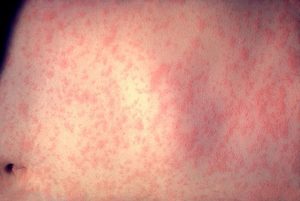Dear Patients,
As many of you may already know, Michigan is now among a growing list of states experiencing measles outbreaks, with state health officials confirming 21 cases so far in Oakland County and one in Wayne County since March 13. In an effort to keep you and your family healthy we offer the following information and resources. We hope this is helpful and that your family is staying well!
Yours Truly,
Drs. Amy Marcotte, Kelly Campbell, Shiri Gordinier, Nancy Stranz, Brian Adelman, Jerry Weinberg and M. Kuykendall of Women’s Health and Menopause Center
*FOR OUR PREGNANT PATIENTS*:
– If you have NO concern that you have been exposed to the Measles virus, we will check your immunity status by testing your blood at your next obstetric visit. You may also call the office and have a blood draw visit scheduled sooner, if you desire.
-If you ARE concerned that you have been exposed to the Measles virus, please, call the office and leave a message for one of our obstetricians. We will call you within 24 hours to help facilitate your care.

Measles Exposure Site List:
Symptoms of Measles:
The disease is spread through coughing and sneezing. Symptoms usually begin seven to 14 days after exposure and can include a high fever, cough, runny nose and red, watery eyes. The initial symptoms are followed by tiny white spots in the mouth and then a blotchy red body rash.
How do I contract the virus?:
Measles is transmitted by direct contact with infectious droplets or by airborne spread when an infected person breathes, coughs, or sneezes. Measles virus can remain infectious in the air for up to two hours after an infected person leaves an area.
Who is at great risk of complications?:
People at high risk for severe illness and complications from measles include:
- Infants and children aged <5 years
- Adults aged >20 years
- Pregnant women
- People with compromised immune systems, such as from leukemia and HIV infection
How do I know if I am immune?
At least ONE of the following:
- written documentation of adequate vaccination:
- one or more doses of a measles-containing vaccine administered on or after the first birthday for preschool-age children and adults not at high risk
- two doses of measles-containing vaccine for school-age children and adults at high risk, including college students, healthcare personnel, and international travelers
- laboratory evidence of immunity
- laboratory confirmation of measles
- birth before 1957
Should I or my family members get the vaccination?
Children: CDC recommends routine childhood immunization for MMR vaccine starting with the first dose at 12 through 15 months of age, and the second dose at 4 through 6 years of age or at least 28 days following the first dose.
Students at post-high school educational institutions: Students at post-high school educational institutions without evidence of measles immunity need two doses of MMR vaccine, with the second dose administered no earlier than 28 days after the first dose.
Adults: People who are born during or after 1957 who do not have evidence of immunity against measles should get at least one dose of MMR vaccine.
